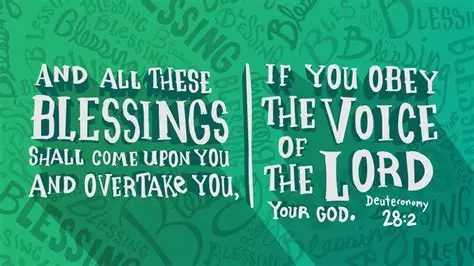OBEDIENCE—THE MASTER KEY TO GOD’S BLESSINGS
THE SEED
“And these blessings shall come upon you and overtake you if you obey the voice of the Lord, your God.” — Deuteronomy 28:2 (NIV)
Obedience to God is the key to unlocking His blessings. Throughout Scripture, we see that God’s promises are tied to our willingness to follow His commands. It is not enough to simply believe in Him or attend church—true blessings come from living a life of obedience. Deuteronomy 28:1-14 outlines the blessings that follow those who walk in obedience. Abraham’s life is a perfect example.
When God asked him to sacrifice his only son, Isaac, Abraham obeyed without hesitation. Because of his trust in God, he became the father of many nations and received abundant blessings. Many desire God’s blessings but struggle with obedience. However, disobedience excludes us from His favor. If we do not obey the Word of God that we read, how can we expect to hear His voice? Obedience is not just about saying “Amen” to a prophetic word—it is about actively walking in alignment with God’s
instructions.
God’s blessings are not automatic; they require obedience. When we choose to follow His ways, He makes His dwelling with us, and we experience the goodness of heaven on earth.
BIBLE READING: Deuteronomy 28:1-14
PRAYER: Lord Jesus, grant me the strength to trust and obey You fully. May my obedience open the doors to Your abundant blessings. Amen.
ÌGBỌRÀN—KỌ́KỌ́RỌ́ SI IBÙKÚN ỌLỌ́RUN
IRUGBIN NAA
“Àwọn ìbùkún wọ̀nyí yóò dé bá yín, yóò sì bá ọ bí obá ṣègbọràn sí ohùn Olúwa, Ọlọ́run rẹ.” — Diutarónómì 28:2 (NIV)
Ìgbọràn sí Ọlọ́run ni kọ́kọ́rọ́ láti ṣí àwọn ìbùkún Rẹ̀ sílẹ̀. Jálẹ̀ Ìwé Mímọ́, a rí i pé àwọn ìlérí Ọlọ́run ní ìsopọ̀ pẹ̀lú ìmúratán wa láti tẹ̀ lé àwọn àṣẹ Rẹ̀. Ko to lati gbagbọ nirọrun ninu Rẹ tabi lọ si awọn ijo. ibukun otito wa lati gbigbe igbesi aye igboran.
Diutarónómì 28:1-14 tọ́ka sí àwọn ìbùkún tí ń tẹ̀ lé àwọn tí ń rìn nínú ìgbọràn. Igbesi aye Abraham’ jẹ apẹẹrẹ pipe. Nígbà tí Ọlọ́run ní kó fi Ísákì ọmọkùnrin òun kan ṣoṣo rúbọ, Ábúráhámù ṣègbọràn láìsí iyèméjì. Nítorí ìgbẹ́kẹ̀lé rẹ̀ nínú Ọlọ́run, ó di baba ọ̀pọ̀ orílẹ̀-èdè, ó sì rí àwọn ìbùkún púpọ̀ gbà.
Ọpọlọpọ fẹ awọn ibukun Ọlọrun ṣugbọn Ijakadi pẹlu igboran. Bí ó ti wù kí ó rí, àìgbọràn yọ wá kúrò nínú ojúrere Rẹ̀. Bí a kò bá ṣègbọràn sí Ọ̀rọ̀ Ọlọ́run tí a kà, báwo la ṣe lè retí láti gbọ́ ohùn Rẹ̀? Ìgbọràn kì í ṣe nípa sísọ “Amin” sí ọ̀rọ̀ àsọtẹ́lẹ̀—it jẹ́ nípa rírìn taratara ní ìbámu pẹ̀lú àwọn ìtọ́ni Ọlọ́run. Awọn ibukun Ọlọrun kii ṣe adaṣe; wọ́n nílò ìgbọràn. Nigba ti a ba yan lati tẹle awọn ọna Rẹ, O ṣe ibugbe Rẹ pẹlu wa, a si ni iriri oore ọrun lori ilẹ.
BIBELI KIKA: Diutarónómì 28:1-14.
ADURA: Oluwa Jesu, fun mi ni agbara lati gbẹkẹle ati gbọràn si Ọ ni kikun. Kí ìgbọràn mi ṣí àwọn ilẹ̀kùn sí àwọn ìbùkún rẹ̀ lọpọlọpọ. Amin.
